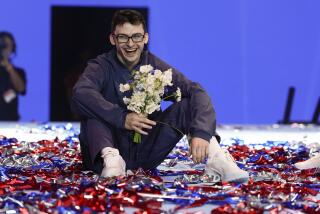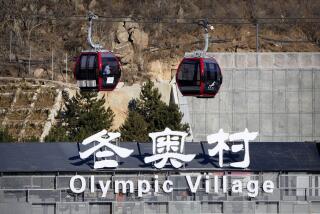Don’t Quote Me on This
- Share via
SCHINIAS, Greece — Moments after the final of a women’s Olympic rowing event here, English-speaking reporters vainly tried to get their questions across to the Romanian gold medalists.
The translator reacted to every question in English with a puzzled look. Finally, a Romanian reporter who spoke more fluent English than the interpreter, took over, relaying the questions to the rowers from her country.
As simple as it might seem, trying to get a postgame comment from an Olympic athlete can be a jarring and confusing experience even for those jaded scribes who call each edition of their newspaper “the Daily Miracle.”
“The athletes give answers in their own language for more than a minute and the translation lasts 10 seconds,” sportswriter Vahe Gregorian of the St. Louis Post-Dispatch said. “There is no way to understand what they really mean.”
There are three methods reporters employ to get the quotes from athletes that end up in newspaper game reports.
The first test in this journalistic triathlon is called “the mixed zone.” At every venue, organizers set aside an area where reporters lean over a waist-high barrier to conduct interviews with Olympians as they head for the locker room.
The mixed zone inevitably becomes a mosh pit where reporters frantically fire questions at sweaty, breathless athletes in a Babel of languages. There frequently are so many reporters that only a few can get near enough to the Olympians to hear their comments. After the customary elbowing and jostling, reporters sometimes confer and share notes.
Some athletes walk right through the mixed zone without stopping.
After the women’s marathon last Sunday, U.S. reporters in the mixed zone shouted to American bronze medalist Deena Kastor. Kastor eagerly obliged them until anti-doping officials swooped in and pulled her away for a drug test.
Hours later, at nearly 1 a.m., U.S. Olympic Committee officials arranged for Kastor to address American reporters by calling a scratchy speakerphone at the Main Press Center from her cellphone.
Then there are the post-competition news conferences, which appear more civilized than mixed-zone interviews. In practice, though, language barriers sometimes render those sessions equally frustrating.
Translators sit next to the athletes at a table. Many scribble on notepads as they listen to athletes and look at their moving lips to better understand them. An Olympic volunteer takes a microphone to reporters who raise their hands.
The questions and answers usually are translated into English. Another translator does the honors in the language of the host nation. Depending on interest in the event, translators who speak other languages are also provided.
“There is no flow to the interviews,” Gregorian said, because it takes too long to translate comments into so many tongues.
Nuance is sacrificed for the sake of efficiency at times.
The Greek-to-English translator at the weightlifting venue did not even try to decipher the metaphors that Greek weightlifting star Pyrros Dimas sprinkled throughout his remarks.
Asked about doping scandals in his sport, Dimas replied in Greek, “When you are high up in the tree, it blows hard, so you have to hold on tightly.”
The translation to English was a dull observation that the most successful athletes should expect the closest scrutiny.
At a soccer game involving the Iraqi team, U.S. reporters struggled to understand the English translation of the coach’s comments in Arabic. The English-to-Greek translator had the same problem and asked the Arabic-to-English translator to repeat himself several times.
“Please,” the English-to-Greek translator implored. “I think [what the coach said in Arabic] is something important.”
Finally, reporters who cannot make it to a stadium -- or those who want to verify what they heard in the mixed zone or news conference -- can go to “flash quotes” posted on a computer system. But the translated comments often sound so stilted that some reporters question their usefulness.
“You hope [the quotes] accurately portray what the person just said,” Mark Woods of the Florida Times-Union said. “The meaning can easily get lost in the translation.”
More to Read
Go beyond the scoreboard
Get the latest on L.A.'s teams in the daily Sports Report newsletter.
You may occasionally receive promotional content from the Los Angeles Times.






